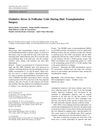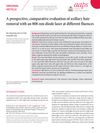 13 citations,
December 2012 in “Cells”
13 citations,
December 2012 in “Cells” Targeting the actin cytoskeleton could improve skin healing and reduce scarring.
 9 citations,
September 2017 in “Nanoscale Research Letters”
9 citations,
September 2017 in “Nanoscale Research Letters” Graphene oxide helps deliver a skin healing agent over time, improving skin and hair follicle regeneration.
 9 citations,
January 2017 in “Elsevier eBooks”
9 citations,
January 2017 in “Elsevier eBooks” Skin's epithelial stem cells are crucial for repair and maintenance, and understanding them could improve treatments for skin problems.
 8 citations,
November 2020 in “Optics and Laser Technology”
8 citations,
November 2020 in “Optics and Laser Technology” LED light therapy is effective for skin and hair treatments but requires careful use to minimize risks.
 8 citations,
July 2010 in “Aesthetic Plastic Surgery”
8 citations,
July 2010 in “Aesthetic Plastic Surgery” Adding more glutathione to the preservation solution doesn't reduce oxidative stress in hair transplants.
 7 citations,
March 2016 in “Journal of Cosmetic and Laser Therapy”
7 citations,
March 2016 in “Journal of Cosmetic and Laser Therapy” Home-use lasers and IPL devices are unlikely to directly cause paradoxical hair growth; it may be linked to inflammation or hormonal issues.
 6 citations,
July 2013 in “Experimental and Therapeutic Medicine”
6 citations,
July 2013 in “Experimental and Therapeutic Medicine” Ginsenoside Rg1 protects mouse skin from UVB damage and helps control inflammation.
 4 citations,
March 2022 in “Frontiers in pharmacology”
4 citations,
March 2022 in “Frontiers in pharmacology” Prunus mira Koehne is valuable for hair growth and has potential for sustainable use, but needs more research and conservation.
 4 citations,
October 2017 in “Advances in tissue engineering & regenerative medicine”
4 citations,
October 2017 in “Advances in tissue engineering & regenerative medicine” Researchers created a potential skin substitute using a biodegradable mat that supports skin cell growth and layer formation.
 4 citations,
April 2011 in “International Journal of Radiation Biology”
4 citations,
April 2011 in “International Journal of Radiation Biology” Radiation significantly slows down wound healing in mice.
 3 citations,
April 2019 in “bioRxiv (Cold Spring Harbor Laboratory)”
3 citations,
April 2019 in “bioRxiv (Cold Spring Harbor Laboratory)” Beta-caryophyllene, found in essential oils, helps wounds heal better in multiple ways.
 3 citations,
September 2018 in “Journal of Biomaterials Science, Polymer Edition”
3 citations,
September 2018 in “Journal of Biomaterials Science, Polymer Edition” Different materials affect the growth of brain cells and fibroblasts, with matrigel being best for brain cell growth.
 3 citations,
December 2015 in “Acta Veterinaria Brasilica”
3 citations,
December 2015 in “Acta Veterinaria Brasilica” A chinchilla got ringworm from stress and contact with dog-related items.
 2 citations,
November 2023 in “Curēus”
2 citations,
November 2023 in “Curēus” Platelet-rich plasma (PRP) speeds up skin wound healing and has potential in medical and cosmetic uses.
 1 citations,
May 2023 in “Journal of molecular evolution”
1 citations,
May 2023 in “Journal of molecular evolution” Pangolins have lost some skin-related genes, but kept others, leading to their unique scales and skin features.
 1 citations,
July 2020 in “Dermatology”
1 citations,
July 2020 in “Dermatology” Photobiomodulation helps reduce pain, lessen inflammation, heal wounds, and can be used in skin treatments. It also boosts hair growth in women with hair loss and may help fight microbes and prevent respiratory issues in COVID-19.
 1 citations,
May 2017 in “InTech eBooks”
1 citations,
May 2017 in “InTech eBooks” Some cosmetic procedures show promise for treating hair loss, but more research is needed to confirm their safety and effectiveness.
 1 citations,
January 2012 in “Elsevier eBooks”
1 citations,
January 2012 in “Elsevier eBooks” The document concludes that the skin is a complex organ providing protection, sensation, and healing, with challenges in treating conditions like itchiness.
 December 2024 in “Deleted Journal”
December 2024 in “Deleted Journal” New therapies show promise for wound healing, but more research is needed for safe, affordable options.
 January 2024 in “Burns and trauma”
January 2024 in “Burns and trauma” The skin microbiome helps heal wounds and can be targeted to improve healing.
 January 2024 in “Regenerative Biomaterials”
January 2024 in “Regenerative Biomaterials” Metal organic frameworks-based scaffolds show promise for tissue repair due to their unique properties.

Elastin-like recombinamers show promise for better wound healing and skin regeneration.
 December 2023 in “International Journal For Multidisciplinary Research”
December 2023 in “International Journal For Multidisciplinary Research” Indian medicinal plants can help with hair growth and common hair issues.
 September 2023 in “International journal of biomedicine”
September 2023 in “International journal of biomedicine” Minoxidil might help treat acne scars by reducing collagen buildup.

L-PGDS has specific binding sites for its functions and could help in drug delivery system design.
 April 2019 in “Archives of aesthetic plastic surgery”
April 2019 in “Archives of aesthetic plastic surgery” Higher fluences in 808-nm diode laser treatments are more effective for axillary hair removal.
 April 2019 in “International research journal of pharmacy”
April 2019 in “International research journal of pharmacy” Adiantum capillus extract reduces pain and swelling in animals.
 January 2018 in “Elsevier eBooks”
January 2018 in “Elsevier eBooks” Topical imiquimod is as effective as 5-fluorouracil for treating actinic keratosis, with about a 5% risk of it turning into squamous cell carcinoma.

Human scalp hair follicles have PGE2 and its receptors, which might affect hair growth.
 November 2011 in “Advanced Materials Research”
November 2011 in “Advanced Materials Research” Adding 1% hair fibers to brake materials improves friction and wear, making them more effective.






























